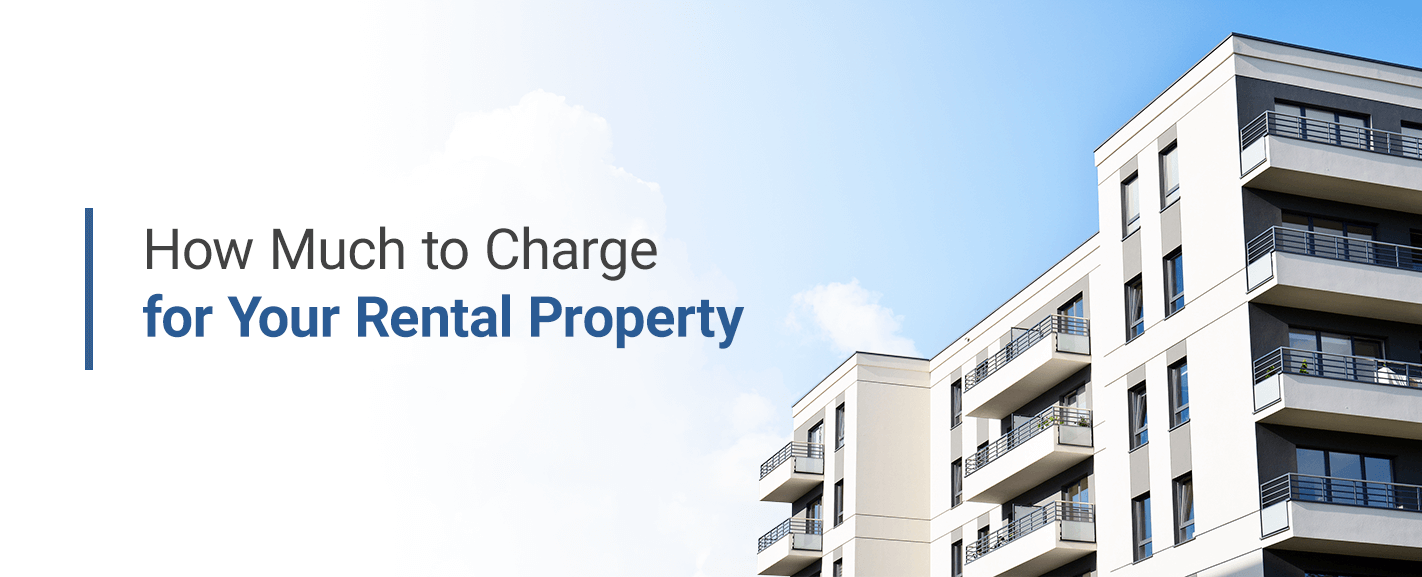How Much to Charge for Your Rental Property

When you’re ready to rent your first property, you have the opportunity to make some extra income for relatively little work. However, renting your property, whether it is an apartment or a home, requires ample planning, especially when it comes to price.
Determining the right rental amount can be overwhelming if you aren’t prepared. You want to make sure that the amount you charge for rent is attractive to prospective renters, and high enough to cover your costs and make a profit. There are a number of important factors to consider.
Understanding how to determine the right rental price might seem daunting, especially if you’re not familiar with how to calculate the rental rate for your house or apartment. Luckily, you can easily work out the rental rate yourself. American Heritage Property Management has gathered some information that can help you decide how much to charge to rent your apartment or house.
Determine Your Property’s Worth
Before you can figure out how much to charge for rent, you need to know how much your property is worth and what people would be willing to pay for it. You might be inclined to think that your property's value is equal to the amount you paid for it, but that’s not always the case. While that is part of calculating your property’s worth, there is much more to it.
When calculating your property’s value, you might want to consider these factors:
- Comparable property values
- Location
- Demand
When professionals determine a home's value, they carefully consider each of these details. Realtors and property managers often put together what is commonly referred to as a comparable market analysis. These reports contain the details and information that help create your home’s value.
You can use these factors to determine how much you should charge for rent:
Comparable Property Values
Comparable property values are properties that are similar in size and condition. In addition to those details, appraisers and property managers will include the number of bedrooms and bathrooms when looking at comparable properties.
Sometimes, there isn’t a true comparable unit. In those situations, either the search location is widened or a value is assigned to the feature that is present in one property but not in the other. When you examine each of these qualities, you will have the information you need to accurately determine your property value.
Location
The location of your home also matters. Whether your property would be best suited for a family and is located within a good school district will matter to the renters and will affect the property value. Think about who would be most inclined to rent your home and what advantages will be the most persuasive to them.
Demand
Demand can drastically affect the value of your property. If you have a highly sought-after property, its obscurity would likely increase the value of the home. Similarly, you have to consider if there’s a surplus of similar properties on the market. Why would someone pay more when they could get the same thing for less?
Even though you will not be selling your home, being informed about your property is the first step toward deciding how much you should and can charge for rent. A property manager can help you if you are unsure how to calculate your property’s worth.
Be Wary of a Quick Estimate
There are many online calculators and tools that claim they can tell you the value of your home, but you should exercise caution when using them. They may be able to give you an idea of what your home might be worth, but they aren’t always accurate. The same goes for estimating your rental price.
These tools can be helpful, but you should break down your costs and other features and benefits that would affect the rental price. Online rental rate calculators can serve as an excellent way to double-check your work. However, keep in mind that different online calculators come up with different rates.
Let a Professional Help You Determine Rental Price
If you’re not interested in completing the calculations or aren’t sure what constitutes a true comparable property, the easiest way to determine your home’s value is to have it evaluated by a professional, such as a property manager or appraiser. Your home’s value is used as part of the fundamental rent price calculation.
Having a professional appraise your home will give you an accurate idea of what you can expect people would pay for your home, and it can provide you with peace of mind in knowing that you are charging the right amount. This way, you can feel confident when setting your rental rate.
Remember that although the appraised value is a useful tool in determining your property’s worth, you will be determining your rental rate based on much more than the value of the property alone.
Keep reading to learn what else you should consider when determining how much to charge for rent.
Calculating the Rental Price
Your rental price can be easily calculated using a simple formula. Many professionals use the 1% rule. Essentially this means that you can charge around 1% of your home’s value for rent each month. Though this calculation is typically an estimate, it can put you on the path to finding the right rental price for your property.
For less expensive properties that fall under $100,000, you would use the higher percentage, likely between 1% and 1.1%. Conversely, for more expensive properties, you would calculate the rent using a slightly lower percentage of 0.8%. Using this formula requires you to have an accurate estimate of your home’s value.
It’s important to use the most accurate and current property valuation, so you can be sure you’re using the right numbers when calculating how much to charge for rent.
More Than Just a Mortgage
When you are renting your property, you should make sure that you have all of your costs covered. Think about the costs that go into your monthly payment on your property. Make sure you have included any additional payments, such as your taxes and insurance. If your property has an association with dues, include that fee, too.
Here are some additional costs to consider when you are deciding how much to rent your house for:
Homeowner's Insurance
Homeowner’s insurance is important, especially when you’re the landlord. If you are renting your home or apartment, you should factor your insurance costs into the rental price. As a landlord, you will need a more comprehensive insurance policy, and the extra coverage will likely be more expensive.
Taxes
Unless your taxes are escrowed into your mortgage payment, you will want to add in a monthly amount that will cover your taxes. You can easily break down your annual taxes into 12 months to determine how much extra to add. The extra amount is known as PITI, as it includes principal, interest, taxes and insurance.
Homeowner and Community Association Fees
Additionally, you should include any homeowner and community association or property association fees. Does your property have a monthly fee that you are required to pay? You can pass that cost down to the renter because they will be utilizing the space.
The Importance of Documentation for Knowing How Much You Can Charge for Rent
The details above comprise the information you need to assemble when determining how much to charge.
You won’t need to provide your tenant with a breakdown of how you calculated your rent as long as you are not charging your tenant separate fees, but it is important that you know them so you can adjust them should tax rates or your home value change. Keep meticulous records and have detailed plans.
Budget for Maintenance
Unfortunately, you cannot assume that your tenant will be capable or willing to handle the general maintenance or repairs of the property. Many people are renting with the expressed purpose of avoiding that responsibility. Not only can repairs require the costly assistance of a professional, but the parts or equipment can be expensive, too.
Some professionals recommend that you set aside at least 5% of the gross income from the rental to help offset the cost of repairs or vacancies during renovations or repairs. While you might not want to increase the monthly rent that much, you still need to consider those costs.
Remember that you will eventually need to make some repairs. You might not want to charge your tenant a separate maintenance fee or deductible. A potential negative effect of charging an incident deductible or maintenance fee could occur if your tenants don’t communicate issues to you as they happen because they might not be able to or want to incur the extra charge. Your property could deteriorate as a result of this practice, which is not good for you or the tenant.
Amenities to Consider When Determining Rental Price
When you set your rental price, you should add in any amenities that are included. If you are paying extra for beneficial amenities for your property, but you aren’t including them in your rental price, you could be wasting your money and missing out on an opportunity to make a profit. Use the desirability of the property when fixing your price.
Here are some questions you should ask yourself regarding amenities you may include:
- Will you include utilities in the rental price, or will the tenant have to pay that independently?
- What about lawn maintenance and snow removal? Will you or the tenant cover that responsibility?
- Is parking included?
- Will your rental property be furnished?
- Will you allow pets? If so, will you simply take a deposit or factor that into the rent?
- If you’re renting a condo, are there building amenities, such as a pool or fitness center, that should be considered?
Should You Include the Cost of Amenities?
Depending on your answers to the above questions, you may need to raise your rental price to accommodate the extra amenities. Remember that they would not have been included in the value of your home.
Amenities typically serve as an attractive feature for prospective tenants because they see them as a value-added benefit. There are many other amenities you could consider, and they will vary depending on the property type and extra services available.
Including extra amenities may be attractive to potential renters. If you have a large pool of qualified applicants who are interested in your property, you will know that you have included the right extra benefits at the right price. Amenities are not required, but extras can give you an advantage over your competition.
Putting a Price on Priceless Benefits
Some benefits can’t be assigned a true dollar value. An example of a priceless benefit could be a view — how do you put a price on a view? The ability to have a natural wonder at your doorstep is an amazing feature that simply cannot be found just anywhere. What about peace and quiet? Nature and wildlife? These things will affect the price.
While a view itself, for example, isn’t a tangible item that carries a price, you can adjust your rental price depending on how much accessibility your property offers to the view. If your rental is on the beach, consider how much of the ocean your tenants would be able to see. You essentially charge for that access.
Look back to the pricing of comparable properties. Did the view affect their price? If they have a full, unobstructed view, you will probably find that their rate is more expensive than a unit with only a partial view. If the view could change, say in the event of construction, you have to factor that into the price, as well.
Repercussions of Charging Too Little
You should be careful and purposeful when charging rent. You certainly want to secure a pool of qualified tenants who want to rent your property, but you should be careful not to charge too little. If you don’t charge enough, you may not be able to cover all of your costs. Make a careful decision to ensure you consider little things that you might not have originally thought of when deciding how much to charge for rent.
Costly Maintenance and Upkeep
Even though your property might have been recently renovated or you have a property that could seem impervious to maintenance claims, you still need to budget for surprises. What happens if the power goes out and the sump pump stops working? The result could be a basement flood, which could cause damage.
In that instance, your property insurance could cover your costs, but you must consider costs that the insurance might not cover. Additionally, you still want to perform general upkeep, which can quickly add up if you have not budgeted for those costs when calculating your rent.
Tax Consequences
Additionally, if you charge too little for rent, you could face negative tax repercussions from the IRS. When a rental price is below the fair market value, the IRS will not consider the property a rental property. That means that you will lose out on tax deductions and other tax benefits that come with being a landlord.
This situation frequently occurs when a property is rented to a family member, for example. Many parents would likely not want to make a profit or charge their children full price, but as a result of this practice, they can’t claim the property as a rental.
Be careful when determining your rental rate. No matter who your tenant will be, it is important to be cognizant of how much you are charging and be careful not to charge too little.
Repercussions of Charging Too Much
Although charging too much for your rental property will not carry the same repercussions as charging too little, there are still consequences that can negatively affect your profit margins. Be sure you’re charging the fair market rental price.
One obvious consequence of charging too much is that you might deter would-be renters from considering your property. Your property could be out of their budget or may not seem worth the price if renters don’t see the value of the cost. Charging too much for rent may result in less interest in your property, and a longer period that your property sits vacant.
If you price yourself out of the going rental market rates in your area and cannot find a renter, you won’t be in a position to make any money.
Reap the Rewards of Leasing Your Property
There are a number of benefits to being a landlord. If you choose to rent your property, you can benefit from a number of tax breaks as well as the possibility of earning extra money. It all starts with determining the best rental price for your home or apartment.
Beginning the process of determining the right rental price is the first step in becoming a landlord. Educating yourself on your state’s rental laws and your home or condo’s value, you will be well on your way to being a successful landlord. Learning as much as you can and doing the right research will pay dividends.
Setting the right rental price is an excellent way to begin a great relationship with your tenant. They will find value in the property and in what they are paying without feeling like they’re being cheated. Similarly, you will reap the rewards that come with an income property.
If you’re still unsure or would like some help determining how much you should rent your house for, contact AHPM for a free quote!




